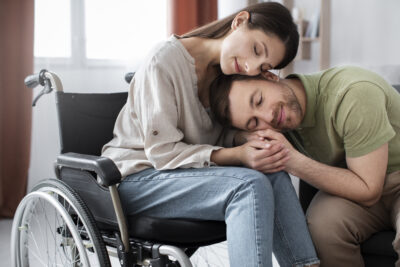Embracing Intimacy: My Thoughts As A Wheelchair User On Sex And Disability
When people think of sexuality and intimacy, they think of the Diet Coke Man from 90s or the Timotei Woman in the Waterfall from the early 80s… they don’t think of short fat wheelchair users!
Society often overlooks the topic of sex and disability, creating a void of understanding and playing to the agenda that disabled people don’t have, or shouldn’t have sex. As a lifelong wheelchair user myself I intend to use this post to look at this area and may be even share some thoughts on my own experiences.

Growing up as a wheelchair user in the 80s and 90s sex was always a subject that was unspoken about. Obviously, I knew about the birds and the bees, but if I’m honest I didn’t think it was for me I thought it was something non-disabled people did.
For those of you who know me know I consider myself fairly able… (at that point ten people spit coffee everywhere)! By that I mean I went to mainstream primary school and mainstream comprehensive school and only really recognised my disability when I went to college and lived in accommodation with other disabled students. So, I always grew up considering myself not having a disability, but yet never thought about having sex!

Like many of the Protected Characteristics in the Equality Act 2010 disability challenges societal norms and perceptions of what is considered “normal”. It’s important to understand that in most cases (mine included) a person’s disability does reduce their ability not to experience pleasure, desire, or engage in fulfilling sexual relationships. Wheelchair users, like anyone else, have diverse desires, preferences, and identities that contribute to their unique experiences of intimacy.
Open communication and consent are vital in any relationship, and this is especially true when working a way through the tricky subject of sex and disability. I say tricky because it can be perceived as a minefield, I remember someone asking me once in an effort to try and catch me out “if you get married would you wife become your primary carer?” I don’t know what the answer to that is really, here’s two thoughts on it.
Yes, they would! Would either of you want another person coming in to your relationship at intimate moments like having intercourse?
No, they wouldn’t! Why should a disabled person expect their spouse to become their main carer, that puts an added strain on their relationship and removes any form of independence they both may have.
However, this is a commonly held thought, when I was young a family member said to me that it would have to be someone special to go out with me…. Now I didn’t think they meant because I’m high maintenance lol but because it would need to be someone who was prepared to take on all my care needs. What are your thoughts on this, are you a disabled person who has married their carer, or their partner has become their carer. Maybe you’re a disabled person in a relationship but has separate care, how does that work?
Disability can influence body image and self-esteem, which may affect one’s confidence in intimate situations. Society’s beauty standards often exclude disabled people, perpetuating feelings of inadequacy. However, building self-esteem is a personal journey, and surrounding yourself with a supportive and understanding partner can make a significant difference.

I commented on the fact that I’d never thought sex was for me earlier, that’s because I couldn’t see the logistics of it. However sexual satisfaction and pleasure can be enhanced by the use of adaptive devices and assistive technology. Wheelchair users may utilise various aids, such as modified beds, positioning equipment, or ergonomic supports, to accommodate their physical needs and explore different sexual positions. I’ve spent some time looking into this…all in the name of research obviously, and will do more as I believe it’s a subject that is still very much unexplored in my life. Apparently, these tools are designed to enable a more comfortable and enjoyable experience for both partners, fostering a sense of empowerment and autonomy.

A tumbleweed in the desert
The act of making love/having sex scares me, with my condition I break easily, A funny story that springs to mind was about fifteen years ago I was talking to someone who I knew that had my disability. She had broken her hips having sex… and had to explain that to both the doctors (who incidentally were very good and had worked it out lol) and her parents. This blew my mind, a wheelchair user like me having sex….. schwoosh, the sound of a tumbleweed passing bye!
There was a time where the thought of breaking a bone through sex would have scared the you know what out of me. But I suppose as I’ve got older and with less time left on this planet I’m not bothered. Plus sexual pleasure is more than penetration. Intimacy encompasses a broad spectrum of activities, including sensual touch, oral sex, and emotional connection. Wheelchair users often emphasise the significance of non-genital forms of pleasure and the importance of emotional intimacy, which can be just as fulfilling and enjoyable as traditional sexual acts.
Oral sex is something I can comment on, this has happened to me lots over the years and people always find it a shock. They look at me like they’ve just seen their grandparents canoodling, it’s quite funny – they often forget that I’ve got needs too.
I went to Naidex two years ago and saw two stalled TLC Trust![]() (Responsible Sexual Services for Disabled People) and Hot Octopuss
(Responsible Sexual Services for Disabled People) and Hot Octopuss![]() (Adult Toys for All). I was surprised by their presence but they really impressed me. I intend to invite these on to a podcast in the near future to explore this subject further.
(Adult Toys for All). I was surprised by their presence but they really impressed me. I intend to invite these on to a podcast in the near future to explore this subject further.
Thanks for reading, come back soon to read our piece on Inter-Able releationships
Best wishes

Leave a Reply